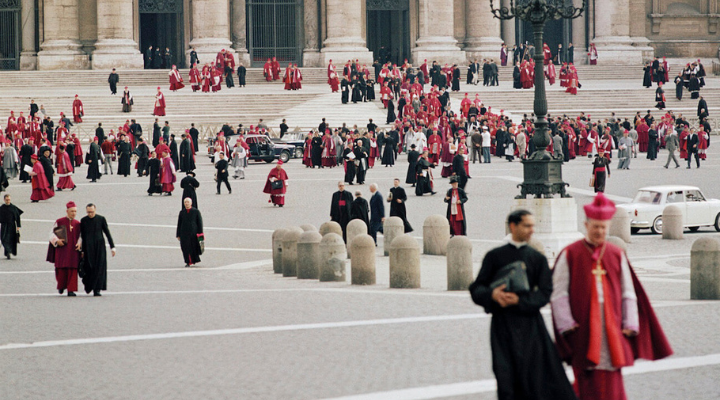
In his homily, Pope Francis built his preaching around the words that Christ addressed to Peter in the Gospel: "Do you love me? (...) Feed my sheep". (Jn 21:15 and 17).
First a look from above. This gaze corresponds to Jesus' question to Peter: "Do you love me? A question that the Lord always asks us and that he asks the Church. Far from pessimistic perspectives as well as humanly too optimistic perspectives, and without going into it, says the Pope in line with previous Popes:
"The Second Vatican Council was a great answer to that question. It was to rekindle her love for what the Church, for the first time in history, dedicated a council to questioning herself, to reflecting on her own nature and her own mission. And she rediscovered herself as a mystery of grace generated by love, she rediscovered herself as the People of God, the Body of Christ, the living temple of the Holy Spirit".
Indeed. And these are not pseudo-theological abstractions, but realities that belong to faith. And not to a theoretical faith but to a living faith, that is, the faith that works and lives by love (cf. Gal 5:6). And the Church is a "sacrament" (a sign and instrument) of God's love (cf. LG, 1).
And now it's our turn: "Let us ask ourselves -Francisco invites if in the Church we start from GodHis enamored gaze upon us. There is always the temptation to start from self rather than from God, to put our agendas before the Gospel, to let ourselves be carried away by the wind of worldliness to follow the fashions of the times or to refuse the time that Providence gives us to turn back".
He goes on to warn against two mistaken extremes: "Let us be vigilant: neither progressivism that adapts to the world, nor traditionalism or 'involutionism' that longs for a past world are proofs of love, but of infidelity. They are Pelagian selfishness, which puts one's own tastes and plans before those of others. to the love that pleases God, that simple, humble and faithful love that Jesus asked of Peter".
Francis invites us to rediscover the Council from God's love and from the essential saving mission of the Church, which she must fulfill with joy (cf. John XXIII, Allocution to the Council of Trent, "The Church's mission of salvation"). Gaudet Mater Ecclesia at the inauguration of the Second Vatican Council, October 11, 1962). A Church that knows how to overcome conflicts and controversies in order to bear witness to the love of God in Christ.
"We thank you, Lord, for the gift of the council. You who love us, deliver us from the presumption of self-sufficiency and the spirit of worldly criticism. Deliver us from self-exclusion from unity. You who feed us with tenderness, lead us out of the precincts of self-referentiality. You, who want us to be a united flock, deliver us from the diabolical deception of polarizations, of 'isms'. And we, your Church, with Peter and like Peter, say to you: "Lord, you know everything; you know that we love you" (cf. Jn 21:17).
Pope Francis.
The second lookThe Church's mission is to "shepherd" because she is a "pastoral people" at the service of salvation. She "shepherds" because she is a "pastoral people", at the service of salvation. This is how she is and she carries it out by relying on the work of her pastors, even if not exclusively, because the Church's mission calls for "organic cooperation" between pastors and faithful, each according to his or her condition and vocation, ministries and charisms. This is being rediscovered in the process of the current synod on synodality, which the Pope has extended until October 2024.
This gaze - the Pope continues - leads to "being in the world with others and without ever feeling ourselves above others, as servants of the Kingdom of God (cf. LG 5), and without clericalism".
The third look: is an overall view. Because it is a matter, Jesus tells Peter, of feeding "my sheep", all the sheep, the Pope observes, and not just some of them. For that would be to give in to polarization (to devote oneself to only part of the sheep). And, therefore, to tear the heart of the mother Church. Our outlook must be one that seeks unity, ecclesial communion, avoiding disunity and extremism.
Importance of unity: "All Church, all. The Lord does not want us like this, we are his sheep, his flock, and we are only together, united. Let us overcome polarization and defend communion, let us become more and more 'one'. (...) Let us leave aside the 'isms' - both progressivism and traditionalism - the people of God do not like this polarization. The people of God is the holy faithful people of God, this is the Church".
The Pope's message moves, therefore, in these coordinates: living faith, mission, unity.
In these days some articles have been and are being published that air what they consider to be the fundamental failure of the Council. One of them is by R. Douthat ("How Catholics became prisoners of Vatican II", New York Times, October 11, 2022). The author further argues that Vatican II was necessary and cannot be undone. Therefore, he concludes, there is no choice but to try to resolve the contradictions it bequeathed to us. Thus, the Catholicism that will one day overcome the Council "will continue to be marked by the unnecessary ruptures created by its attempt at necessary reform". A perspective that, it seems to me, does not exactly help to understand the reality of the Council, nor the present moment of the Church and its mission.
Mr. Ramiro Pellitero Iglesias
Professor of Pastoral Theology
Faculty of Theology
University of Navarra
Published in "Church and new evangelization".